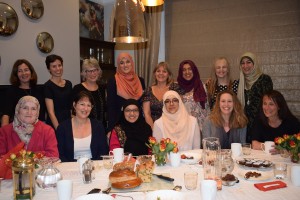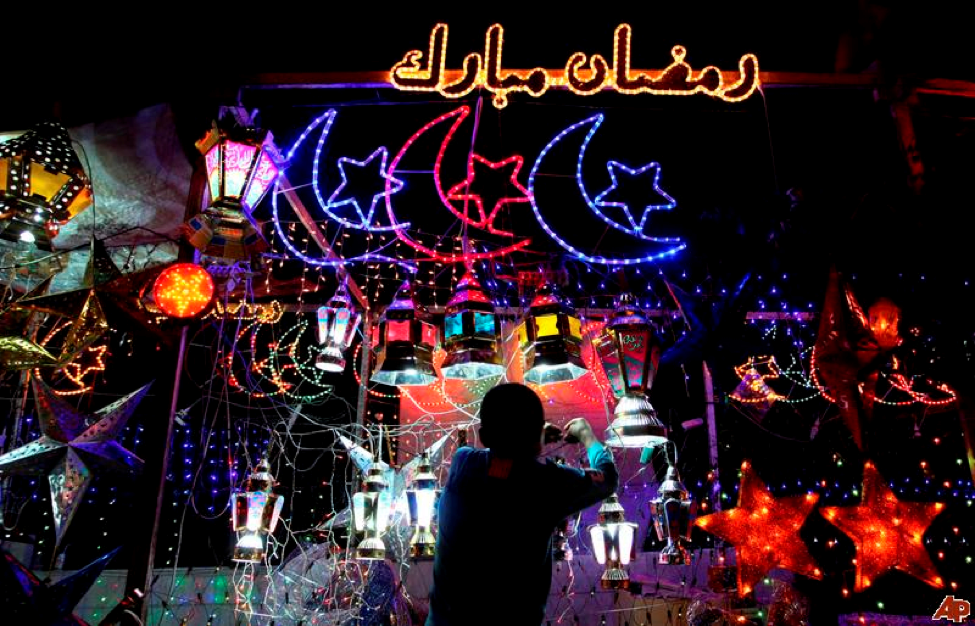As the holy month of Ramadan began this weekend we asked our West-London Nisa-Nashim co-chair, Lorraine Hamid, to share with us her reflections on what this month means to her, and Muslims everywhere. Lorraine will be posting each week during Ramadan to share further thoughts and insights into this important month. Ramadan Mubarak to all of our Muslim sisters.
The sun is out, in the distance you hear the ice cream van tinkling it’s tempting tune to go and devour some cold, sweet, creamy loveliness. Hurray! It must be time to go for a 99, right? Wrong! You’ve experienced your first #Ramadan fail! The sun will be with us for hours yet and as it’s Ramadan you won’t eat or drink a thing until sunset. Cue the start of hours of anticipation and day dreaming about ice cream, cold drinks, hot drinks, big burgers, small cupcakes, chocolate, steak…you get the picture.
This salivating day dream is something we experience many times over in the 29-30 days of fasting we call Ramadan. The basic principle is to avoid consuming any food or any drink from dawn until sunset every day. Yes that even includes water – it’s a no no. No food or drink really does mean no food or drink. How long this abstention lasts each day depends on where you are in the world. The closer you are to the equator, the shorter the day. Those of us in north west Europe this year will do an average 18-hour fast. So why do people want to do this? Who shouldn’t do it? How DO you do it?
The why is pretty simple. Fasting is one of the five pillars of faith. We fast not for ourselves, though we can get tangible benefits from it as I will touch on later. Primarily, we fast in service to God. Only He knows whether we complete the day without breaking the fast, so it is an act of worship for God alone. But it is also a fact that fasting offers the opportunity to enter a higher state of mind, body and spirit. So worship undertaken in Ramadan is not just about suspended rewards to enjoy in the Hereafter. You can gain a lot from Ramadan in the here and now. This is why many people look forward to and enjoy Ramadan. Yes, really!
In short, Ramadan is the highlight of the year for Muslims due to it’s social, cultural and spiritual significance. Most obviously, family and friends gather every evening to break the fast together. This meal, known as an ‘iftar’, is highly anticipated and, as is the norm with any kind of meal based gathering, usually laden with special foods and drinks. Feeding fasting people is an honour with many competing to feed as many people as possible. Think a month of many dinner parties and foods you only see once a year and you’ll get the idea. Festive food and togetherness are a big part of the fond memories you make in Ramadan. In some places, the streets are decorated with lights, special food stalls are set up selling sweet meats and treats, children are given special gifts to mark the beginning of Ramadan. There is an air of excitement and anticipation in the air. In Egypt for example, children are given a new colourful lamp or fanoos which they delight in playing with as they run around the specially decorated streets singing ‘Ramadan has come and made us happy after being away for a while…welcome back Ramadan’.
As a cultural moment then, Ramadan is hard to resist. This is perhaps why many Muslims who year-round wouldn’t observe all tenets of the faith, find themselves returning to worship in Ramadan. They choose to take on the seemingly difficult act of fasting and may also join in other parts of the festivities. For many people, regardless of their level of practice, Ramadan is a great way to reconnect with faith, re-start daily rituals and meet their co-religionists. For the rest of the year, you might never pick up the Quran or any book about faith, never step near a mosque or a prayer mat, never try to get up in the middle of the night and do extra worship and fasting. But when Ramadan comes around, you can find yourself getting into the swing of doing many or all of these things for a whole month. Should you choose to then, the momentum of practicing these ‘new habits’, can last beyond the thirty days. Or it might not! We are only human after all!
Every week this Ramadan, I will reflect more on what Ramadan is about and what it feels like in everyday life. Fasting doesn’t mean the suspension of all normality, especially here in the UK. We fast, we work, we take exams, we keep calm and carry on. We are advised to have clear intentions for everything we do as Muslims. So for Ramadan we try to set intentions (some spiritual but they can be anything), we dedicate the month to God and we ask Him for help in succeeding. Lord knows we need that help. There are daily struggles to avoid many types of #Ramadan fails. But there are also the joys of achieving a #Ramadan win like getting the full iftar spread out on the table on time! In this blog, I will also try to answer more fully questions like, do you lose weight fasting, is it bad for you? Depends. Do you have to fast if you’re ill/menstruating or pregnant? No. What happens if you miss a day of fasting? Depends. In the meantime, I would love to know what other questions you have about Ramadan. Also, what are your #Ramadan fails and #Ramadan wins? Let me know on [email protected] and I will try and feature them in upcoming blogs.
Until next time insha Allah (if God wills), I wish you all a joyful, peaceful and meaningful Ramadan.
Lorraine Hamid


